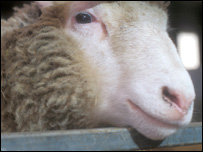
The entry on Dolly the sheep was said to contain inaccuracies
|
A study on the accuracy of the free online resource Wikipedia by the prestigious journal Nature has been described as "fatally flawed".
The report, published in December last year, compared the accuracy of online offerings from Encyclopaedia Britannica and Wikipedia.
Nature found that both were about as accurate as each other on science.
Encyclopaedia Britannica has hit back at the findings, calling for the paper to be retracted.
In a document on its website, Encyclopaedia Britannica said that the Nature study contained "a pattern of sloppiness, indifference to basic scholarly standards, and flagrant errors so numerous they completely invalidated the results".
The scholarly slanging match prompted an equally robust response from Nature.
"We reject those accusations, and are confident our comparisons are fair," it said in a statement.
Nature said it did not intend to retract the original article.
Online collaboration
The original study was conducted by the Nature news team. They asked a number of scientists to assess 50 pairs of articles from relative newcomer Wikipedia and from the well established encyclopaedia.
Wikipedia was founded in 2001 and is based on wikis, open-source software which allows anyone to edit, add, delete, or replace an entry. It relies on volunteer contributors to update its pages.
Topics in the Nature study were as diverse as the Archimedes Principle and Dolly the sheep. The reviewers were asked to check for errors, but were not told about the source of the information.
The study found only eight serious errors, such as misinterpretations of important concepts, four from each encyclopaedia.
However, Nature also claimed to have found other factual errors: 162 in Wikipedia and 123 in Britannica.
Wikipedia criticisms
Although the longer established encyclopaedia does not claim to be error free, it said that the research "grossly exaggerated Britannica's inaccuracies" and that according to the figures "Britannica was far more accurate than Wikipedia".
In a lengthy document, it went on to rebut more than 50 specific points raised in the study.
Following the Nature study, both Wikipedia and the Britannica made corrections to some of their entries.
Late last year, Wikipedia came under fire for the accuracy of its articles.
In particular, prominent US journalist John Seigenthaler attacked an entry that incorrectly named him as a suspect in the assassinations of President John F Kennedy and his brother, Robert.
The false information was the work of Tennessean Brian Chase, who said he was trying to trick a co-worker.
Wikipedia responded to the criticisms by tightening up procedures.
